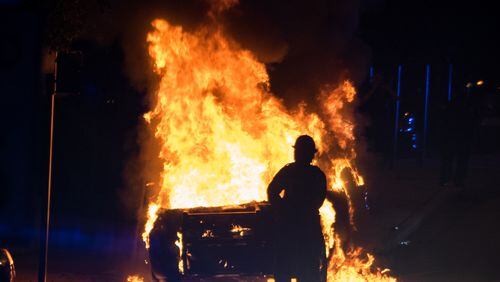Rick Diguette is a local writer and retired college instructor who often writes about higher ed issues for this blog. Today, he raises concerns about the early news reports on the Georgia Tech shooting and how they may have shaped the narrative that police were at fault.
By Rick Diguette
On Saturday night, a man placed a 911 call to Georgia Tech campus police alerting them to “a suspicious person on campus,” and describing this person as a white male with long blond hair, wearing a white T-shirt and jeans and possibly armed with a knife or gun.
Soon after campus police confronted a man fitting the description and ordered him to drop his weapon. He refused to comply, instead challenging them to “Shoot me!” Again he was ordered to drop his weapon and again he failed to comply. Eventually, as he advanced toward one of the officers, he was shot and killed.
As everyone now knows that man was Scout Schultz, who, at the time of his death, was a 21-year-old student at Georgia Tech majoring in computer engineering.
When the story broke, no one knew the 911 caller and the “suspicious person” were one and the same. Perhaps if that had been part of the initial narrative, the police wouldn’t have come in for so much instant criticism. Perhaps Scout Schultz’s bereaved father would not have asked the police “Why did you kill my son?” at his Monday news conference. And perhaps violence wouldn’t have erupted during an otherwise peaceful protest on the Georgia Tech campus last night.
Perhaps.
What has happened since Scout Schultz was killed Saturday night has become all too familiar in recent years. A citizen is shot and killed by police, videos soon surface on the Internet, the police are vilified, and violent protests follow a day or two later. In some of these cases, the video evidence appears to be conclusive of police misconduct and excessive use of force, although police tribunals and trial juries haven’t always seen things that way.
But the death of Scout Schultz is different. Scout deliberately put himself in harm’s way and arguably made the Georgia Tech campus police his accomplices. What motivated him to do that may be explained in one of the three suicide notes found in his dorm room, the contents of which have not been made public and probably won’t be now that the family plans to file a civil suit against the Georgia Tech Police Department.
There’s another thing about this case that is very familiar: the warp speed with which the shooting of Scout Schultz morphed from an isolated incident on the campus of Georgia Tech into a national headline, and how that headline quickly came to be viewed like all the other headlines we’ve seen since the shooting of Michael Brown in Ferguson, Missouri, on Aug. 9, 2014.
The media has a duty to report on incidents like this one, and the public has a right to know when the police use deadly force and under what circumstances. The police must also understand that their performance in the line of duty will be minutely scrutinized after the fact, oftentimes by people who know little or nothing about lawful police procedures. A problem arises, however, every time the narrative outpaces the available facts, which is what happened in this case.
If it had been known that Scout Schultz was the 911 caller, and that he had given the police a description of a “suspicious person” exactly matching his own, the story’s profile and the initial reaction to it would have likely been quite different. But by then the initial reaction had hardened into a settled opinion: the police were once again guilty of excessive use of force. And when it became known on Monday that the GBI had found three suicide notes in Scout’s dorm room, the wheels of anger and protest were already in motion.
The time has come for the media to reconsider how it covers incidents involving the deadly use of force by law enforcement. In early reports not enough emphasis is placed on what isn’t known, and this invariably and understandably leads readers and viewers to “fill in the blanks” with preconceived ideas about the police and how they conduct themselves when dealing with armed and unarmed citizens.
This is not an argument for giving law enforcement more time to make the facts fit a preferred narrative. Police misconduct is real, and when it occurs the police must be held accountable. But it’s also important to recognize that incidents like this one tend to take on a life of their own. They can very easily become something they are not, and when that happens it’s difficult to undo the damage that’s been done.
An otherwise peaceful protest and vigil organized by Georgia Tech’s Pride Alliance to honor the memory of Scout Schultz erupted in violence Monday night. Three people were injured and at least one police vehicle set on fire. And what made Scout Schultz call 911 and describe himself as suspicious, armed, and possibly dangerous remains a mystery.







